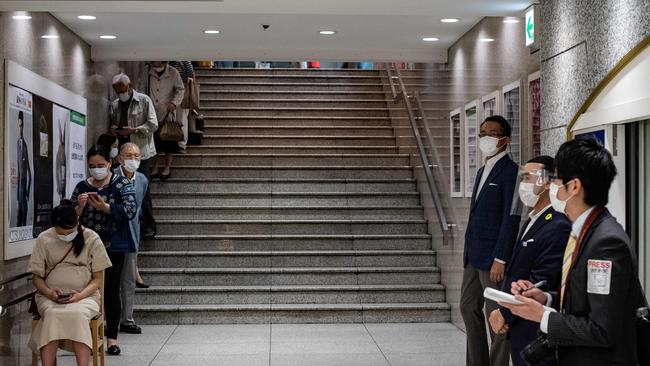Coronavirus: Shinzo Abe lifts state of emergency
Japan has lifted its nationwide state of emergency over the coronavirus, after new cases slowed to a crawl.

Japan lifted its nationwide state of emergency over the coronavirus on Monday, signalling a reopening for the world’s third-biggest economy after new cases slowed to a crawl.
Compared with hard-hit areas in Europe, the US, Russia and Brazil, Japan has been spared the worst of the pandemic, with 16,581 cases in total and 830 deaths.
Yet with infections threatening to run out of control, Prime Minister Shinzo Abe declared an initial state of emergency for Tokyo and six other regions on April 7 — later expanding it to cover the entire country.
Businesses and schools were urged to shut and people were requested to remain home, but Japan’s “lockdown” was far softer than in other parts of the world and there was no punishment for anyone flouting the rules. Citizens largely heeded the orders, with most of Tokyo’s famously packed streets falling quiet, and the number of new infections has fallen from a peak of about 700 a day to just a few dozen nationally.
High levels of hygiene and general health, removing shoes indoors, widespread use of masks, bowing rather than shaking hands or kissing — all are advanced as reasons why the pandemic has hit Japan less hard than comparable countries, but analysts agree there has been no silver bullet.
Japan has come under fire for a relatively low level of testing, with about 270,000 carried out, the lowest per capita rate in the Group of Seven advanced economies, according to Worldometer.
The world’s third-largest economy has plunged into its first recession since 2015, data published last week showed, shrinking by 0.9 per cent in the first quarter.
In a bid to stem the damage, Mr Abe has ordered a mass handout of ¥100,000 yen ($1420) a person.
A recent poll for the Asahi Shimbun found support for Mr Abe had dropped to 29 per cent — the lowest since he took office in 2012. He performed a rare U-turn on the cash handouts and is seen to have bungled the distribution of two masks per household, which attracted widespread mockery.
AFP



To join the conversation, please log in. Don't have an account? Register
Join the conversation, you are commenting as Logout